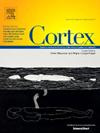成人中重度创伤性脑损伤后叙事性回忆的时间组织减少
IF 3.2
2区 心理学
Q1 BEHAVIORAL SCIENCES
引用次数: 0
摘要
叙述性话语障碍在中重度创伤性脑损伤(TBI)患者中有很好的记录。在这一群体中,对叙事话语(即故事生成、故事复述)的研究经常集中在话语和更大的话语语境(如衔接、连贯、故事语法)之间语义关系的损害上。对创伤性脑损伤中叙事复述的时间组织研究较少。我们采用时间连续性分析(一种传统上用于表征自由回忆词表的时间组织的技术)来量化参与者复述故事的时间组织,并将其与叙述者最初呈现故事细节的顺序相关联。我们还利用Rey听觉语言学习测试的数据对词表回忆的时间连续性进行了平行分析。在叙述记忆和词表记忆任务中,中重度脑损伤的参与者和未受伤的同伴在回忆项目时均表现出高于偶然的时间组织和向前过渡的倾向。然而,这些影响在创伤性脑损伤组显著降低。总的来说,他们的自由回忆表现的时间聚集性更低,在回忆故事时,他们更有可能在故事细节(或单词列表回忆任务中的单词)之间进行更大的跳跃。在多个时间点上检查自由回忆显示,虽然重复(即多次呈现单词表)增加了回忆的时间组织,但对于创伤性脑损伤组和非损伤组来说,长时间延迟(即一周)减少了时间组织。我们认为,中重度脑外伤患者叙述性回忆的时间组织减少与陈述性关系记忆系统的损伤有关。与自由回忆的检索上下文模型一致,记忆中断不仅影响回忆故事细节的总数,而且影响使用时间上下文以顺序组织的方式编码和检索项目的能力。本文章由计算机程序翻译,如有差异,请以英文原文为准。
Reduced temporal organization of narrative recall in adults with moderate-severe traumatic brain injury
Narrative discourse impairments are well documented in individuals with moderate-severe traumatic brain injury (TBI). Studies of narrative discourse (i.e., story generation, story retelling) in this population have frequently focused on impairment of semantic relations across utterances and the larger discourse context (e.g., cohesion, coherence, story grammar). Less attention has been given to the temporal organization of narrative retelling in TBI. We applied temporal contiguity analyses, a technique traditionally used to characterize temporal organization of free recall of wordlists, to quantify the temporal organization of participants' story retellings with respect to the order in which the narrator originally presented the story details. We also conducted a parallel analysis of temporal contiguity of wordlist recall using data from the Rey Auditory Verbal Learning test. Participants with moderate-severe TBI and non-injured peers demonstrated above chance temporal organization and a tendency to make short transitions in the forward direction when recalling items in both the narrative recall and wordlist recall task. However, these effects were significantly reduced in the TBI group. Overall, their free recall performance was less temporally clustered, and they were more likely to make larger jumps between story details (or words in the wordlist recall task) than their non-injured peers when recalling stories. Examining free recall at multiple timepoints revealed that while repetition (i.e., multiple presentations of the wordlist) increased temporal organization of recall, long delays (i.e., one week) decreased temporal organization for both the TBI and non-injured groups. We propose that reduced temporal organization of narrative recall in individuals with moderate-severe TBI is linked to impairments in the declarative relational memory system. In line with retrieved-context models of free recall, memory disruption not only impacts the total number of story details recalled, but also the ability to use temporal context to encode and retrieve items in a sequentially organized way.
求助全文
通过发布文献求助,成功后即可免费获取论文全文。
去求助
来源期刊

Cortex
医学-行为科学
CiteScore
7.00
自引率
5.60%
发文量
250
审稿时长
74 days
期刊介绍:
CORTEX is an international journal devoted to the study of cognition and of the relationship between the nervous system and mental processes, particularly as these are reflected in the behaviour of patients with acquired brain lesions, normal volunteers, children with typical and atypical development, and in the activation of brain regions and systems as recorded by functional neuroimaging techniques. It was founded in 1964 by Ennio De Renzi.
 求助内容:
求助内容: 应助结果提醒方式:
应助结果提醒方式:


